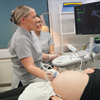Pregnancy is an exciting yet overwhelming journey, often surrounded by myths and misconceptions. While some of these myths are harmless, others can cause unnecessary worry or lead to misinformation. Let’s separate fact from fiction and debunk some of the most common pregnancy myths.
Myth 1: You Must Eat for Two
Fact: While it’s true that pregnant women need extra nutrients, this doesn’t mean doubling your calorie intake. In the first trimester, no additional calories are needed. From the second trimester onwards, an extra 300-500 calories per day is usually sufficient. A balanced diet with plenty of vitamins and minerals is more important than simply eating more food.
Myth 2: Morning Sickness Only Happens in the Morning
Fact: Morning sickness can strike at any time of the day or night. It varies from person to person, with some experiencing nausea throughout the day. Fortunately, for most women, symptoms subside after the first trimester.
Myth 3: You Should Avoid Exercise During Pregnancy
Fact: Staying active during pregnancy has numerous benefits, including improved mood, better sleep, and easier labour. Low-impact exercises such as walking, swimming, and prenatal yoga are generally safe, but it’s always best to consult your healthcare provider before starting or continuing any fitness routine.
Myth 4: Heartburn Means Your Baby Will Have Lots of Hair
Fact: While this is a widely believed old wives’ tale, some studies suggest a link between pregnancy hormones and hair growth. However, heartburn is mainly caused by hormonal changes and the growing uterus pressing against the stomach, not necessarily by the amount of hair your baby will have.
Myth 5: You Can Predict the Baby’s Gender by Belly Shape
Fact: The shape and size of a pregnant belly depend on several factors, including the mother’s body type, muscle tone, and the baby’s position. There is no scientific evidence to support the idea that carrying high means a girl and carrying low means a boy.
Myth 6: You Should Avoid All Seafood
Fact: While some seafood should be avoided due to high mercury levels (such as swordfish and shark), many types, like salmon, sardines, and shrimp, are safe and beneficial. Fish is an excellent source of omega-3 fatty acids, which are crucial for the baby’s brain development.
Myth 7: You Can’t Drink Any Caffeine
Fact: While it’s best to limit caffeine intake during pregnancy, moderate consumption (around 200mg per day, equivalent to one cup of coffee) is generally considered safe. Excessive caffeine intake, however, should be avoided as it may affect the baby’s development.
Final Thoughts
Pregnancy is filled with advice from well-meaning friends and family, but it’s essential to distinguish myths from facts. Always rely on medical professionals and reputable sources for information to ensure a healthy and stress-free pregnancy.













 Packages & Prices
Packages & Prices  Important Info & Policies
Important Info & Policies  Your Scan
Your Scan